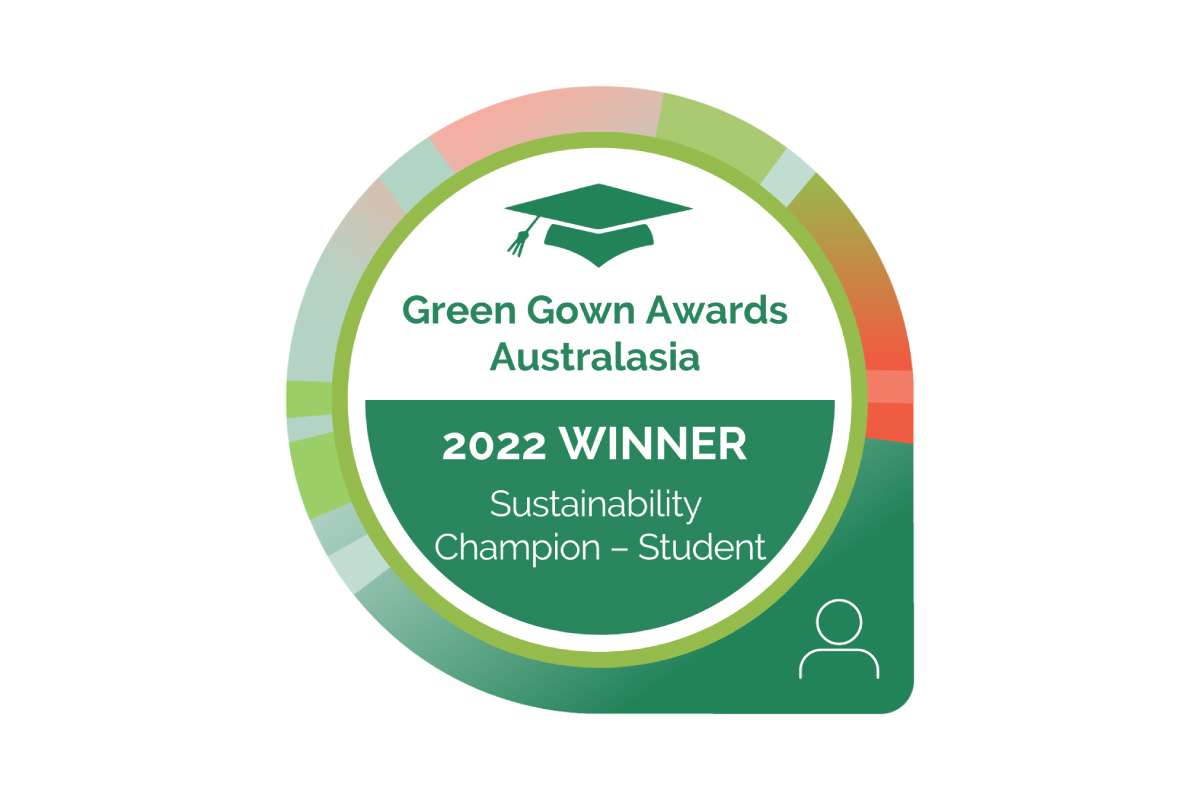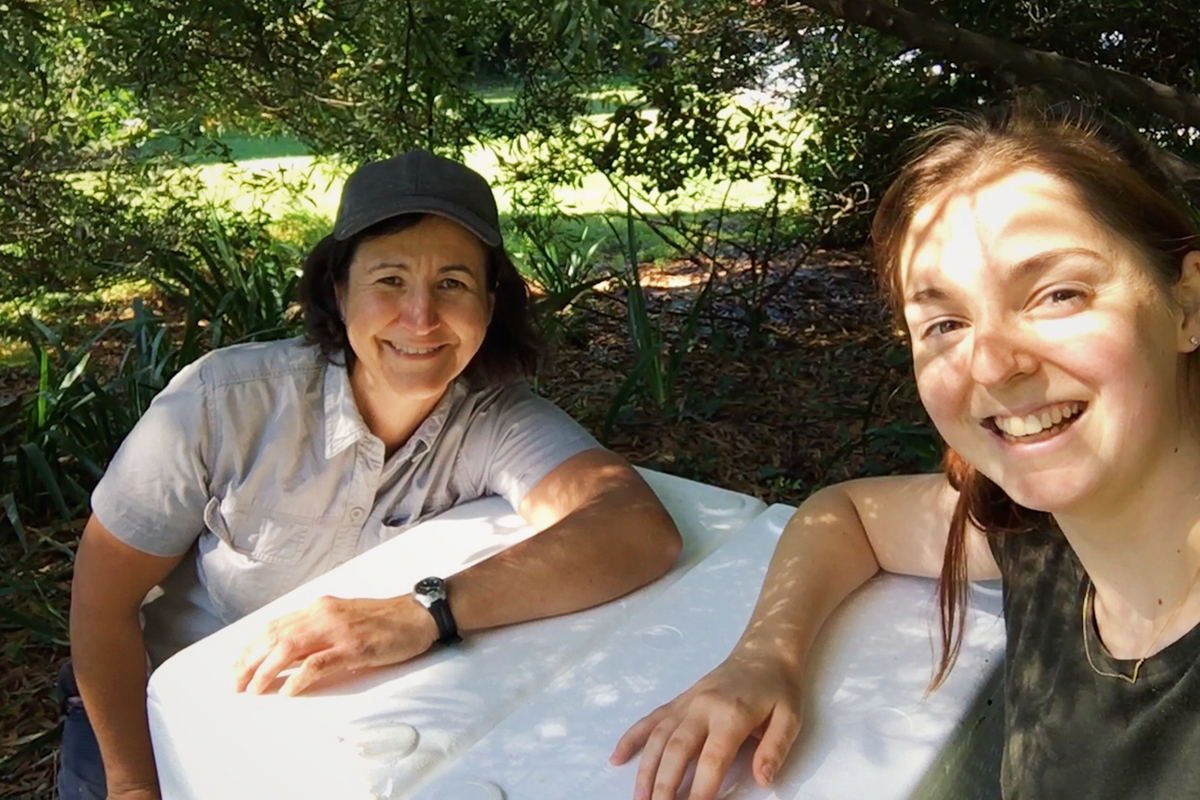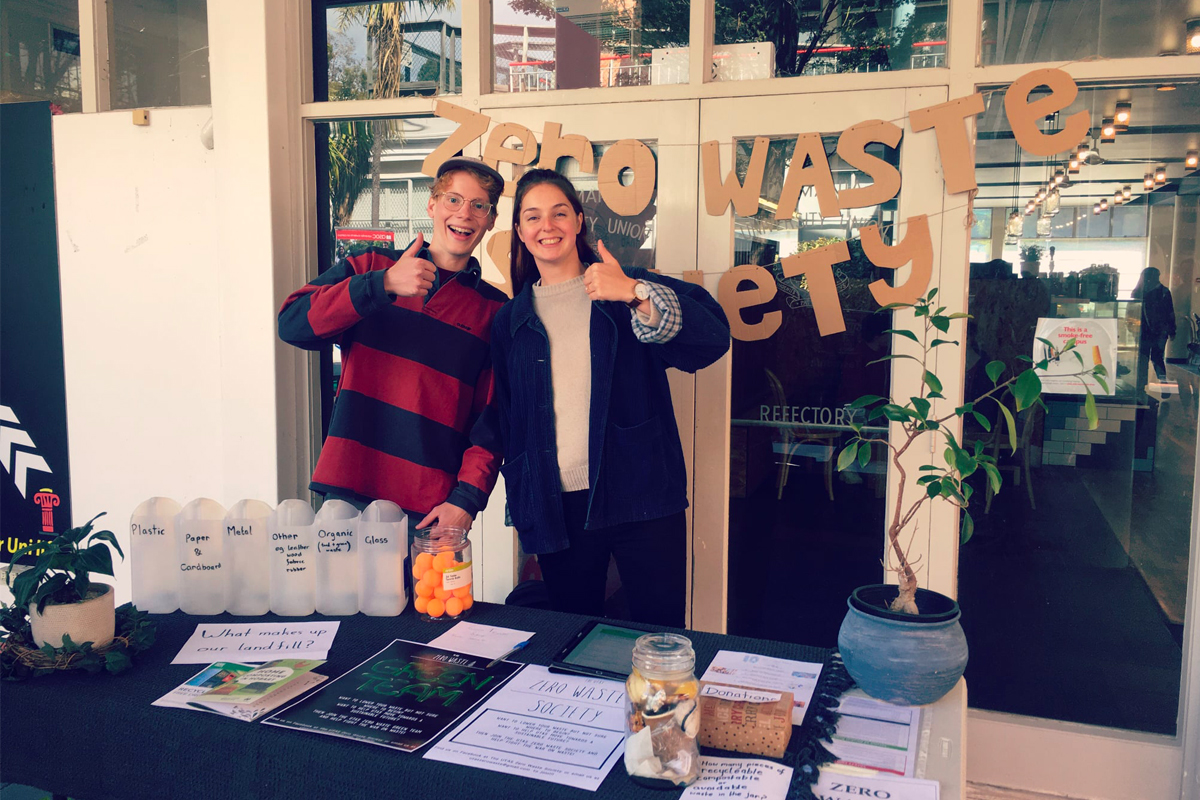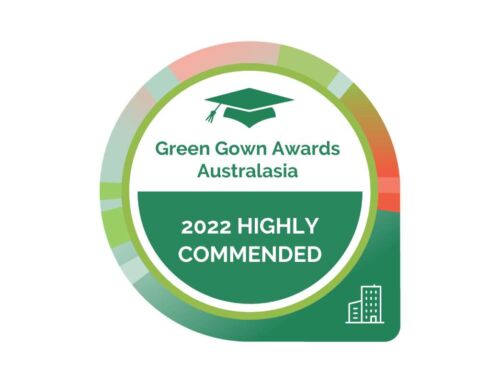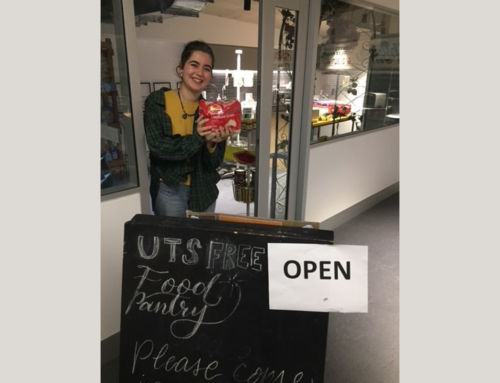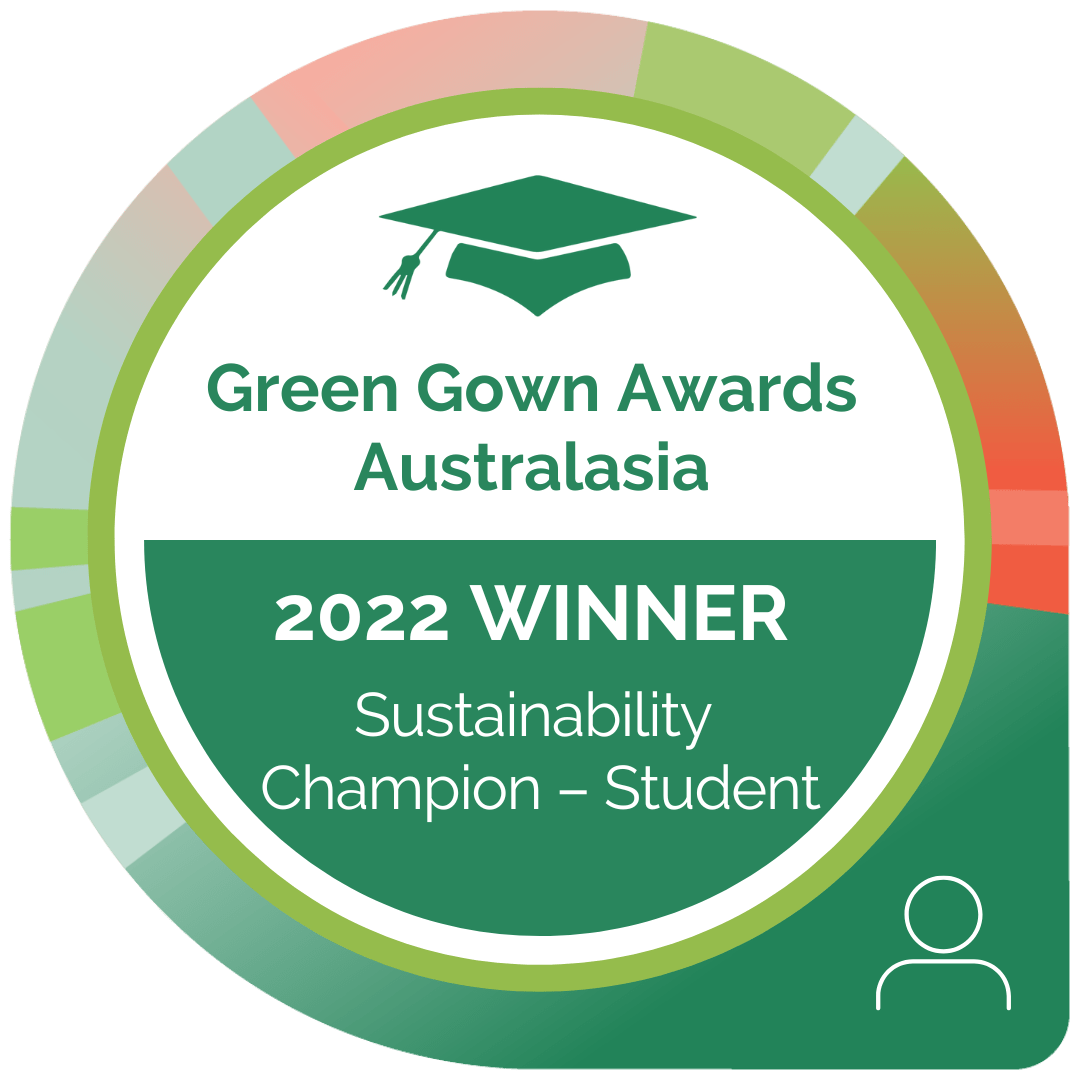
University of Tasmania
I am passionate about environmental advocacy and education. I believe each of us holds great power for change and a responsibility to this planet. I also believe that advocacy alone is not enough; tangible systems must be put in place to facilitate this change. I have been working with staff and fellow students at my student residence for three years to set up a recycling wall, paper collection, a worm farm system, and a FOGO service in order to reduce the waste we send to landfill. I created the Jane Franklin Hall Waste and Sustainability Committee to ensure these projects can continue when I leave. I also founded the UTAS Zero Waste Society, holding clean-up events, talks and online tutorials for students. My passion for the environment is at the core of my chemistry degree and I will continue my work advocating for sustainability for the rest of my life.
> A closer look
I have a passion for helping the environment, as demonstrated in my studies and volunteer work as founder and president of the UTAS Zero Waste Society and the founder and chair of the Jane Waste and Sustainability Committee at my student residence, Jane Franklin Hall.
My mission as a chemist is to discover ways to “up-cycle” greenhouse gases such as carbon dioxide into sustainable fuels and plastics in a chemical process known as small molecule activation. These reactions would alleviate our dependence on fossil fuels and address ever-growing plastic pollution by transforming carbon dioxide from a problematic waste material into a valuable resource. By completing three Dean’s Summer Research Projects, undergoing volunteer research in the second year and completing a research elective in the fourth year, I have exceeded the normal requirements in my science degree to upskill myself to be able to tackle such challenging research in my PhD next year in 2023. My skills in chemistry were recognised by my selection as the valedictorian from the graduating 2021 class in the College of Sciences and Engineering at the University of Tasmania.
Alongside this research, I have engaged in environmental advocacy throughout my time at university. I founded the UTAS Zero Waste Society in the second half of 2019 in order to provide practical information to help students lower their waste contribution to landfill. With the pandemic disrupting the events we’d planned for 2020, we focused on developing the society’s online presence by starting our Instagram page, writing online articles for the university magazine, Togatus, creating educational videos and frequently posting zero waste tips on social media. My role included brainstorming the content, writing many of these posts, recording, editing and featuring in our educational videos, and designing our graphics. When lockdown ended, we were able to host a beach clean-up to South Cape Bay in collaboration with the Tas Uni Bushwalking Club. This event received the 2020 Best Collaboration award from the Tasmanian University Student Association. I was personally awarded a Tasmanian University Student Association Gold Award in 2020 for my dedication to the UTAS Zero Waste Society. The UTAS Zero Waste Society has also hosted events including Seven Mile Beach Coastal Planting, collaborated with the UTAS Avian Club for a bird watching and rubbish clean-up trip in the Peter Murrell Reserve, co-hosted composting education events and ‘10 steps to zero waste living’ seminar.
During the pandemic, I also decided to focus my efforts on implementing systems to facilitate environmental change at Jane Franklin Hall, my student residence. In 2020, I set up a 10-litre soft plastics collection bin which was upgraded due to popularity to two 60-litre bins in 2021. I also began tackling the food waste issue at Jane Franklin Hall. As a fully catered college, we generate at least 20 kg of food waste each day from kitchen scraps and unwanted food. Due to the pandemic, the college was not able to donate money to facilitate addressing this issue, thus I purchased a rotary compost bin myself and a worm farm to begin the process. I then set up a wastepaper collection bin for the carbon portion required for composting. Using an old 10-litre ice cream tub, I collected residents’ dinner scraps and took them to the bin each evening, even when it was dark and raining during the winter months. I negotiated with staff to upgrade this system to a FOGO bin in 2021 and secured funding for this to continue into the future indefinitely. I reached out to Will Plaister who coordinated the Recycling Walls at the University and organised for a recycling wall from him to be set up at the student residence to collect recyclable materials that cannot go in our co-mingle recycling (such as toothpaste tubes and pens). My efforts towards these changes were recognised with the prestigious Jane Franklin Hall Service Award in 2020. At the end of 2020 and 2021, I hosted the Jane Clothes and Goods Swap to help residents dispose of their unwanted items in an environmentally friendly way instead of the provided skip bins.
In 2021, I wanted to build community among students and include others in environmental efforts, to do this I founded and chaired the Jane Waste and Sustainability (JaWS) Committee. Working together as the JaWS committee we were responsible for designing education campaigns to encourage and enable students to use the established waste facilities. We also developed a flier summarising the college’s new waste and environmental initiatives and we provided a flier to every new resident that arrived at the college in 2022, the flier will be given to each new incoming resident in the future. At the start of 2022, I helped place a “switch off” sticker on every single light and heater in the college to remind residents to lower their power usage. I have had to personally invest a great deal of time to make these changes happen, by taking the food scraps to the compost or FOGO bin, recycling the soft plastic at the supermarket, placing posters around the college and advertising the facilities, diving through the skip bins to save large bags of clothing from landfill and taking the clothing and furniture to the op shop.
Early in 2022, I began an internship with the Sustainability Integration Program for Students, developing a database for a zero-waste app. The app represents a culmination of all that the UTAS Zero Waste Society is, and would allow our impact to continue long after each of our executive members has graduated. The app would provide all users with information about how to reduce, reuse, recycle, compost or dispose of any household item. I have also created an educational video interviewing key members of the UTAS Sustainability team to answer the most frequently asked questions we as a society have received about waste and recycling.
> Impact and benefits
My additional science research has allowed me to contribute to the field of catalysis, and I have published two peer-reviewed academic papers on this work . Catalysts lower the energy barrier required for chemical transformations, improving their efficiency, and are a crucial part of small molecule activation.
The UTAS Zero Waste Society South Cape Bay clean-up event was responsible for removing 25 kg of rubbish from Cockle Creek within the Tasmania World Heritage Area, including 600 pieces of microplastics. The impact of increasing awareness and educational initiatives is hard to quantify, however, what can be said is that hundreds of seeds have been planted in the minds of UTAS students over the past three years. The society has over 200 members, and currently has over 700 followers on Facebook and 300 followers on Instagram. We have had 700 views on our educational videos on social media, and over 60 people attended the 10 Steps to Zero Waste Living Seminar. I also created a video for the Wynyard High School 2020 Climate Awareness Day which was shown to the entire school. It may take years before these students are in leadership positions to make tangible changes, but I am confident that the work of the UTAS Zero Waste Society will continue to bear fruit in the future.
My work at Jane Franklin Hall has saved thousands of kilograms of food waste from landfill, recycled hundreds of pieces of plastic through the soft plastic and recycling wall initiatives and diverted hundreds of pieces of clothing to either other residents or an op shop. The advocacy of the JaWS committee has increased resident engagement with the waste facilities. For example, we needed to upgrade the soft plastics bin from a 10-litre bin in 2020 to two 60-litre bins in 2021 due to popular demand, and the waste and environment education flier is given to each new resident this year has further increased the use of the soft plastic bins in 2022. As well as these tangible benefits, my work has raised awareness about the environment among over 250 residents, and the systems I have put in place will continue to divert waste away from landfill and increase environmental awareness once I have left the college.
The systems I have initiated have influenced the management of Jane Franklin Hall to incorporate costs (such as the cost of the FOGO bin service) into their budget so that these initiatives are sustainable and can continue into the future. My actions have created a positive, enabling environment and opened the door for other sustainability conversations at Jane Franklin Hall through the Jane Franklin Hall Student Club and among other staff members.
The database I am creating for the app has distilled what I know about the zero waste lifestyle into a form that can be shared with others, such as the university students that are developing the zero waste app. I have met with the state government, materials recycling facilities and councils in southern Tasmania and have found that there is community support for this initiative as well.
> Leadership and engagement
As a leader, I recognise that people and organisations are resistant to change. As such, I have been willing to put in extra effort to get initiatives off the ground. I was willing to use my own money to set up new systems during the pandemic, do unpleasant tasks like diving through skip bins to save waste from landfill and taking the compost out even when it smelt bad and was raining, and have been willing to put in countless hours organising events, editing videos and making posts. Once initiatives have been set up, I have intentionally worked to build community support, for example by starting the JaWS committee, as I know that others have so much more knowledge to offer than what I have by myself, and we are stronger as a team. I have always believed in leading by example and have thus allowed my environmental passion to flow into all areas of my life, whether it be in my chemistry or at my place of residence. I have also been conscious of creating systems that are independent of myself so that they will have a long-lasting impact once I am no longer there.
> Wider societal impact
I am passionate about environmental advocacy and education. I also believe that advocacy alone is not enough; tangible systems must be put in place to facilitate this change. I founded the UTAS Zero Waste Society to create an apolitically-motivated group that would provide practical information to help students reduce the waste they were sending to landfill. From our beginnings, in 2019 we have grown to be a community of over 200 people. I wanted to create a community that could empower people, declaring with each piece of plastic recycled or avoided that we can make a difference, and what we do does matter. The purposes of this initiative were two-fold: firstly, the direct impact of lowering waste to landfill (an impact which compounds over time), decreasing the waste that ends up in our oceans and lowering greenhouse gases created during waste decomposition. The second goal was more subtle: to increase awareness that we each have great power for change and responsibility to this planet, such that each small student voice we encouraged to advocate for the environment could join a collective, thunderous multitude, to which businesses and governments would be forced to listen.
Jane Franklin Hall has over 100 residents at the college each year, the majority of whom are new residents. By implementing waste reduction strategies, these residents are able to implement habits and expectations that they will take with them throughout their lives. Having these systems in their home, where they see them every day massively increases awareness about waste to each of the residents, and it communicates that sustainable practices are for everyone, not just ‘greenies’. As the college houses people studying a range of degrees, this knowledge can infiltrate a wide variety of sectors that may not traditionally be reached by other environmental awareness strategies. In my time at Jane Franklin, I have created and led education campaigns to reduce energy use, donate clothing, care for worm farms, compost, reduce food waste, avoid plastic waste and increase recycling rates. Each campaign has been designed to be encouraging, and inclusive, building a strong community of students and staff who are passionate about sustainability and can continue this passion into the future. When I moved into Jane Franklin there were no visible sustainability programs, and we have now built a culture that supports students’ ideas and creativity; we have moved mountains! Future students will have new ideas for how we can be more sustainable; maybe they will want bike shelters and on-site renewable power. The JaWS committee provides a place for new students to find support for their ideas and they now have the experience and history of positive change happening at their residence to support them in future endeavours.

